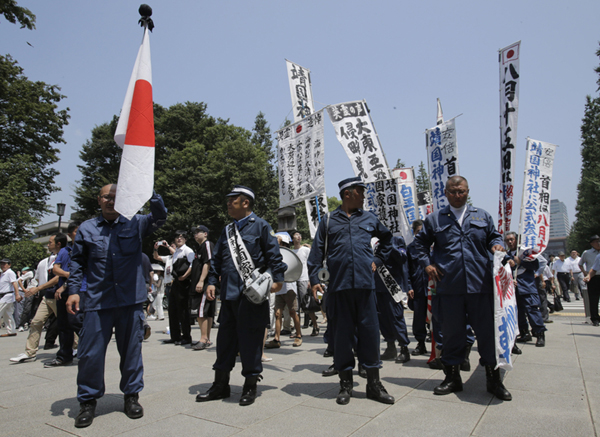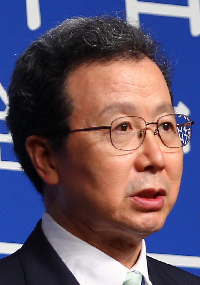Japanese position on war history scrutinized
By ZHANG YUNBI (China Daily) Updated: 2015-03-13 04:34
 |
|
Members of a right wing group arrive at the Yasukuni Shrine to pay respects to Japan's war dead in Tokyo, Aug 15, 2013. [Photo/IC] |
Beijing studies Tokyo's attitude toward former aggression as war anniversary nears
China is "closely watching" Japan's policy agenda and stances this year related to history, according to a senior Chinese diplomat.
He also told China Daily that events to be held in Beijing to mark victory in the world's anti-fascist war are not targeting any specific country.
Cheng Yonghua, Chinese ambassador to Japan, made the remarks after some sections of the media and political figures in Japan claimed that the commemorative events are "targeting" their country.
The events will include a rally, a reception and an evening gala to be attended by foreign leaders.
 |
|
Cheng Yonghua, Chinese ambassador to Japan |
In an exclusive interview, Cheng, a political adviser, said China cares about "how Japan will view and treat such events, and how it will react", and Japan should "reflect on history in real and concrete terms and stick to peace" in the future.
Foreign Minister Wang Yi said this month that the parade and ceremonies are being planned "in accordance with the practices in other countries", which are "perfectly normal and natural".
Cheng said, "The tragedy of that war should never be repeated", and the events to be hosted by China are to remember and honor the sacrifices made, to champion peace and explore a peaceful future.
"Nor do the events target the Japanese people," Cheng said, but rather they will recall the suffering of the Chinese people and "aim to remind people how hard-won the peace is".
He said he believes it is time for Japan to realize that "the avenue toward a war should never be taken again", and it should not "spontaneously label itself as a target" of the ceremonies.
Japan's past aggression "also imposed disaster upon the Japanese people", Cheng said.
He mentioned the joint statement from the two governments in 1972, which symbolized the normalization of ties and clearly stated the trauma brought by the war to the two peoples.
China hopes Japan will "take a correct attitude, stick to its previous correct positions and statements, including the Murayama Statement. We also expect that Japan will remain on the pathway of peace", Cheng said.
The Murayama Statement in 1995 was made by former Japanese prime minister Tomiichi Murayama to apologize for the suffering and losses caused by Japan's wartime aggression.
Cheng said, "If Tokyo attempts to tackle the war incorrectly, or to impose ambiguity or defiance upon its war-related actions, we will worry about it further honoring the pathway of peace."
Any such attempt will "deal serious harm once again" to the people of Asia who suffered under Japan, and the move will be like "peeling off a fresh scab and rubbing salt in the wound", Cheng said.
On a visit to Japan this week, German Chancellor Angela Merkel suggested that "facing history correctly is a precondition for reconciliation".
Cheng said Merkel "displayed the correct attitude toward history regarding that war during her stay in Japan".
Japan should "think seriously about how it will face the issue and what kind of messages it will deliver, as Asian neighbors and the international community are all watching", he said.
A key statement is set to be delivered by Japanese Prime Minister Shinzo Abe on behalf of his government on Aug 15, the 70th anniversary of Japan's surrender.
Cheng said China will be paying close attention to the statement. "The ideas, guiding spirit of the statement and its ultimate presentation are all in our focus."
If the statement explicitly betrays or drifts away from the official consensus, China "will deliberate on countermeasures in accordance with the situation", Cheng added.
When asked about the ideal prescription for stabilizing ties, the ambassador said the key is to stick by the rules.
Cheng also hailed bilateral consultations on maritime and airspace security issues as "very pragmatic".






